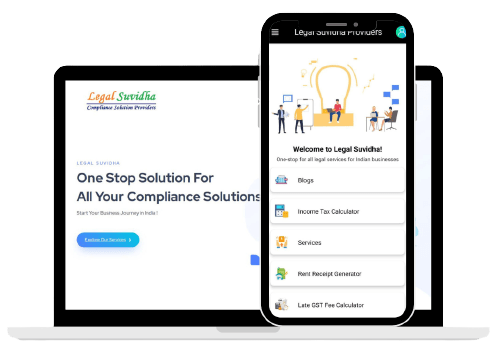GST Notice Lawyer in Mumbai: When Legal Representation Is Essential
Mumbai, as India's financial capital, sees the highest concentration of GST disputes by value. If you've received a significant GST...
A loan agreement is a legal contract between a lender and borrower that outlines the terms and conditions of a loan. The loan agreement defines the details of the loan, including the loan amount, the interest rate, the repayment terms, and any collateral or security that the borrower must provide.

Happy Clients
Years Experience

Happy Clients
Years Experience
Loan agreements can be used for various types of loans, including personal loans, business loans, and mortgages. The loan agreement is a legally binding document that both parties must adhere to. It is designed to protect the interests of both the lender and the borrower and to ensure that the loan is repaid according to the agreed-upon terms.
In addition to the loan amount, interest rate, and repayment terms, a loan agreement may also include provisions for prepayment penalties, late fees, and default terms. Loan agreements are typically written in clear and concise language to ensure that all parties fully understand the terms and conditions of the loan before signing the agreement.
| Clearly defines terms and conditions | A loan agreement specifies the terms and conditions of the loan, including the amount, interest rate, repayment schedule, and any collateral required. This ensures that both the borrower and lender understand their obligations and responsibilities. |
| Provides legal protection | A loan agreement is a legally binding document that protects both the borrower and lender in case of any disputes or defaults. It can be used as evidence in court to enforce repayment or to seek damages. |
| Helps build a credit history | If the borrower makes timely repayments on the loan, it can help build their credit history and improve their credit score. This can make it easier to obtain future loans or credit products. |
| Can offer flexibility | A loan agreement can be tailored to meet the specific needs of the borrower and lender. For example, it can include provisions for early repayment, refinancing, or changes to the repayment schedule. |
| Can provide lower interest rates | A loan agreement can offer lower interest rates than other forms of credit, such as credit cards or personal loans. This can save the borrower money on interest charges over the life of the loan. |
Step 1: Loan Application: The borrower submits a loan application to the lender, providing details about their financial situation and the purpose of the loan.
Step 2: Loan Approval: The lender reviews the application and determines whether to approve the loan, based on factors such as the borrower’s credit score, income, and repayment history.
Step 3: Negotiation of Terms: If the loan is approved, the lender and borrower negotiate the terms of the loan, including the amount, interest rate, repayment schedule, and any collateral required.
Step 4: Drafting of Loan Agreement: Once the terms have been agreed upon, a loan agreement is drafted. This is a legally binding document that outlines the terms and conditions of the loan.
Step 5: Signing of Loan Agreement: Both the lender and borrower sign the loan agreement, indicating their agreement to the terms and conditions.
Step 6: Disbursement of Funds: Once the loan agreement has been signed, the lender disburses the funds to the borrower. This may be done via wire transfer, check, or other means.
Step 7: Repayment: The borrower begins making regular repayments on the loan, according to the terms outlined in the loan agreement. This may involve making monthly payments, paying off the loan in full by a certain date, or other arrangements.
Step 8: Completion of Loan: Once the loan has been fully repaid, the borrower has fulfilled their obligation, and the loan agreement is considered complete.
1. Loan Application
2. Credit Report
3. Income Verification
4. Collateral Documentation
5. Business Documents
6. Legal Documents
7. Loan Agreement
A secured loan is a loan that requires collateral, while an unsecured loan does not. If you default on a secured loan, the lender can seize the collateral to recover the remaining balance of the loan. If you default on an unsecured loan, the lender will have to take legal action against you to recover the remaining balance of the loan.
Yes, you can negotiate the terms of a loan agreement with the lender. However, not all lenders may be willing to negotiate the terms. It’s important to have a clear understanding of what you want to negotiate and to be prepared to make a strong case for why you believe the terms should be changed.
If you can’t repay the loan, you risk defaulting on the loan. This can lead to the lender taking legal action against you to recover the remaining balance of the loan. It’s important to communicate with the lender as soon as possible if you’re having trouble repaying the loan to explore alternative repayment options.
The length of time it takes to get a loan agreement can vary depending on the lender and the type of loan. Some lenders may be able to provide you with a loan agreement within a few hours, while others may take several days to process your application and provide you with a loan agreement.
Once you’ve signed a loan agreement, it becomes a legally binding contract between you and the lender. It can be difficult to get out of a loan agreement, but there are some options available to you. You can explore refinancing the loan with another lender, negotiating a new repayment plan with the current lender, or seeking legal advice.
Yes, a loan agreement can be used for a personal loan. Personal loans are typically unsecured loans, which means that they don’t require collateral. It’s important to read the loan agreement carefully and understand the terms and conditions of the loan before signing it.
With a commitment to exceeding expectations and a passion for delivering results, choosing us means choosing a partner dedicated to your success.

We provide free of cost consultation and legal advice to our clients.

We are a team of more than 15+ professionals with 11 years of experience.


All our services are online no need you to travel from your place.

There are no hidden & extra charges* other than the quote/invoice we provide.

We aim that all our customers are fully satisfied with our services.

We value your time and we promise all our services are delivered on time.

We provide free of cost consultation and legal advice to our clients.
In this Journey of the past 14+ years, we had gained the trust of many startups, businesses, and professionals in India and stand with a 4.9/5 rating in google reviews.We register business online and save time & paperwork.
Trustindex verifies that the original source of the review is Google. I recently got my trademark registered through Legal Suvidha, and I must say the experience was absolutely seamless. The team was proactive in updating me about every stage of the TM application process and patiently answered all my queries. Highly recommended to any startup or business owner looking for reliable legal and compliance support.Trustindex verifies that the original source of the review is Google. I’ve been working with this firm for the past 3 years, and I couldn’t be more satisfied with their services. Their team has consistently provided accurate, timely, and dependable financial and compliance support. A special thanks to Priyanka and Mayank for their dedication, professionalism, and personal attention to every detail. Highly recommended for anyone looking for reliable services!Trustindex verifies that the original source of the review is Google. I've been working with Priyanka and her team at Legal Suvidha for the past 5 years for my LLP, Adornfx Multimedia. They've consistently provided excellent support, especially with ROC filings. Their service is reliable, timely, and hassle-free. Highly recommended!Trustindex verifies that the original source of the review is Google. I am delighted to share my experience with Legal Suvidha Firm, where professionalism and dedication shine through in every interaction. Having worked with them for the past 3-4 years, I can confidently say that their team is truly exceptional. The commitment they show to their work is truly commendable; they deliver on every promise made without any hint of fraud or dishonesty, which unfortunately is not the case with many firms in the market today. Their integrity sets them apart and gives clients the peace of mind they need when it comes to legal matters or any other certifications. Moreover, I have found their pricing to be very reasonable and reflect the quality of services provided. They offer excellent value for money, ensuring that their clients receive top-notch legal services without breaking the bank. I highly recommend Legal Suvidha Legal Firm without any hesitation. If you’re looking for a reliable legal partner with a dedicated team that truly cares, look no further than Legal Suvidha. My experience has been nothing short of excellent, and I am confident that others will feel the same! For Talin Remedies Pvt Ltd Ravi KumarTrustindex verifies that the original source of the review is Google. One of the easiest firms to work with. Soft-spoken, well aware of their scope of work, and the most affordable (especially for new comers). They're always available to help out giving solutions in the easiest way possible. Got their number from a mentor, and would highly recommend their services if you're looking to start and manage accountancy/compliance related work for your firm!Trustindex verifies that the original source of the review is Google. Mayank & the Legal Suvidha team are fantastic. They really try to understand the business like insiders and don't give you templatized solutions. The staff are extremely supportive and go out of their way to help you. I would recommend Mayank to anybody new to the startup ecosystem!Verified by TrustindexTrustindex verified badge is the Universal Symbol of Trust. Only the greatest companies can get the verified badge who has a review score above 4.5, based on customer reviews over the past 12 months. Read more


Explore more of our blogs to have better clarity and understanding
of the latest corporate & business updates.
Mumbai, as India's financial capital, sees the highest concentration of GST disputes by value. If you've received a significant GST...
When a GST notice arrives, one of the first decisions is whom to engage for handling the Notice Response. Should...
While most GST non-compliance results in monetary penalties, certain serious offences can lead to criminal Prosecution Under GST and even...
The GST department uses sophisticated data analytics and risk assessment tools to identify taxpayers for GST Audit. Understanding what triggers...
The Supreme Court GST jurisprudence continues to evolve, with several significant judgments in 2024 clarifying critical issues that impact millions...
The distinction between Intermediary Service and Principal Service provider is perhaps the most contested classification issue for India's IT and...
Here are some answers to potential questions that may arise as you start your business.
Register your business, obtain necessary licenses, and fulfill tax obligations.
Consider factors like ownership, liability, and tax implications to choose from options like sole proprietorship, partnership, or company registration.
Choose a unique business name, obtain required IDs like Director Identification Number (DIN), and file incorporation documents with the Registrar of Companies (ROC).
Obtain GST registration, trade licenses, and any industry-specific permits required to operate legally.
Maintain accurate financial records, file tax returns on time, and adhere to the tax laws applicable to your business.
Yes, startups in India can benefit from various government schemes offering tax exemptions, funding support, and incubation facilities.
Secure patents, trademarks, or copyrights to safeguard your intellectual assets from infringement or unauthorized use.
Challenges include navigating bureaucratic hurdles, complying with complex regulations, and competing in a crowded marketplace.
Looking For More Information? Contact Us
Sign up to receive email updates on new product announcements, special promotions, sales & more.
Redefining the experience of legal services. Now all Professional Services in a Single Click !


Copyright © 2025 Legal Suvidha Providers LLP. All rights reserved.
